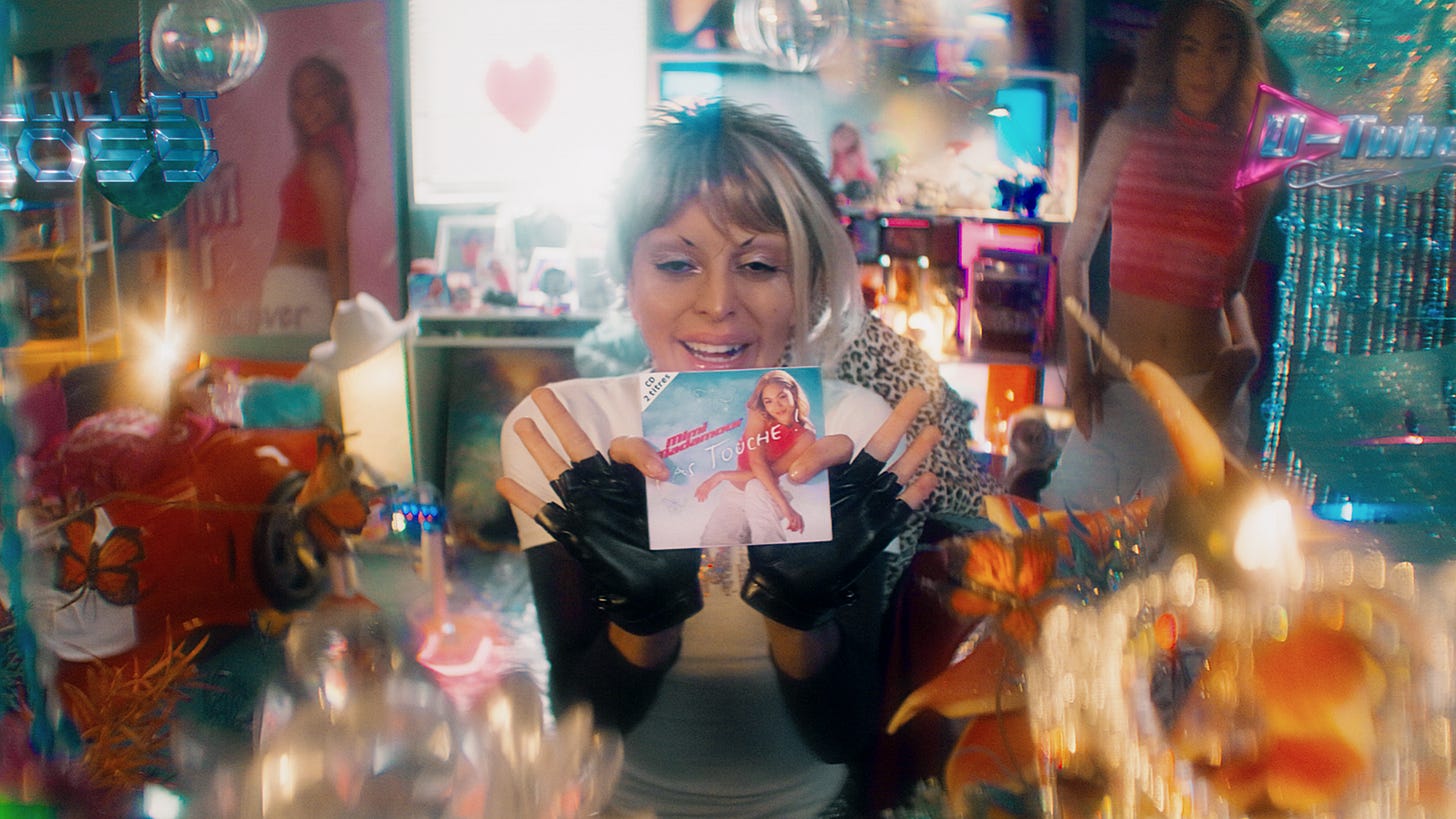The Stories You Hear, They Never Add Up
Reviews of “Pavements” and “Queens of Drama,” two unorthodox music-centered movies.
Recently released to theaters are a pair of unconventional music movies that hold great affection for its subjects. For Pavements, it’s the similarly-named 90s alt rock group; for Queens of Drama, it’s the bubblegum pop and French electroclash divas of the 2000s. My initial annoyances with both films quickly dissipated once I locked on to each director’s intent and focused more on having fun with it.
(Also, I’ve been following all the Cannes coverage at a distance… some really fun looking movies in that lineup and am jealous of everyone there! If you’re gonna be age 18-28 next year, highly suggest looking into the 3 Days in Cannes program. I did it once and it was one of the best three days of my life.)
Pavements
Now playing in NY, LA, and SF, with limited expansion in subsequent weeks.
Movies about real people can be tricky to get right, but biopics about well-known musicians seem particularly thankless. Viewers come in with varying levels of familiarity. Maestro is a detailed examination of Leonard Bernstein’s personal life, but those with little knowledge on his influential music career won’t understand why everyone fusses over this guy. On the other hand, Bohemian Rhapsody, in its attempt to explain every little thing about Queen and Freddie Mercury, becomes a hilariously indistinct pastiche of itself. (I remember cackling at a location caption that simply read “Midwest USA.”) No matter how noble a filmmaker’s intentions, fans of the artist will take umbrage at the creative liberties required to conform often contradictory stories to a satisfying three-act structure.
Making a movie about Pavement seems like a trap. Even at their peak of popularity in the nineties, the indie rock band was always on the fringes of the mainstream1, but their devoted fans are deeply intimate with Pavement arcana.2 A traditional movie wouldn’t do, and it’s fitting that Pavements is as unconventional as Pavement’s music. There are four threads to Alex Ross Perry’s four-pronged documentary, which play out in parallel:
The making of an Oscarbait biopic called “Range Life,” with Stranger Things actor Joe Keery in the role of frontman Stephen Malkmus. Jason Schwartzman and Tim Heidecker are among the all-star cast.
The staging of a jukebox musical titled “Slanted! Enchanted!” starring bonafide Broadway talent. Think American Idiot crossed with Spring Awakening.
A history of the band from cradle to midlife, providing context to unenlightened folks like myself.
A behind the scenes view of Pavement’s current resurgence, with the band preparing for a reunion tour and setting up a gallery exhibition of rare memorabilia.
It shouldn’t take long to realize that the purported rock biopic and Broadway musical are deeply unserious projects. (Heed the disclaimer at the very beginning, which quotes a Pavement lyric: “the stories you hear, they never add up.”) “Range Life” will never get released, let alone sweep the Oscars, and “Slanted! Enchanted!” will never grace the Great White Way. For me, I knew for sure that this was all a joke during a scene in which Keery so intensely studies Malkmus’s Central Valley Californian accent that the actor can no longer speak with his own voice3. At first, I was supremely annoyed by all the surface-level posturing of nonchalance. But by the time the film ended, I came around to liking it quite a lot. Eventually, Pavements reveals the sincerity beneath the sarcasm of “The World's Most Important and Influential Band.” Consider all the preparation it takes to stage a fake musical, shoot a fake biopic, and and stage a fake museum exhibit for this film. Think of all the work that goes into recording and touring music. Neither Perry nor Pavement would do it if they didn’t care, deep down.
There aren’t any rock docs quite like Pavements, and neither are there any rock bands quite like Pavement. So who better to make this movie than a filmmaker whose work is just as distinctive? Perry shares the band’s Gen X sensibility of disaffected irony, and his abrasively scrappy tales of human misbehavior have similarly attracted a cult following4. (He also co-wrote the screenplay for a Disney movie: the Ewan McGregor-starring Christopher Robin.)
Credit must go to editor Robert Greene, who successfully weaves everything together: sometimes multiple aspects of the movie will play out simultaneously, whether in a bifurcated split screen or in a four-panel collage. It got me thinking that the fullest realization of this project would have been as a four-channel video installation, where on each wall, a different element of this film would be projected simultaneously: the making of the fake biopic, the staging of the fake-ish jukebox musical, the story of Pavement, and live concert recordings. (Alex Ross Perry, if you're reading this, it’s not too late to mount the art gallery version of Pavements. You can have this idea for free!)
If I could get a lot out of this movie despite having zero affection or nostalgia for Pavement, I can only imagine how this plays for their fans5. There was one moment in the film that inspired some wistful thinking. The band’s first ever gig was performed for KDVS, the radio station of my alma mater. That got me reminiscing about late-night drives in a car as old as I was, usually going from one end of my small college town to the other, the radio often tuned to KDVS. I don’t think I ever heard them play a Pavement song.
Queens of Drama
Currently in limited theatrical release, with Blu-Ray expected July 15.
Devoted readers of this newsletter know I have a fascination with movies about fictional pop stars, particularly those with songs written by real-world hitmakers6. So when I received a press release for a “Cannes Breakout Glittercore 2000s-Set Queer Pop Musical” about a tortured romance between a pop idol and a punk icon, I immediately wanted to watch it. And Queens of Drama certainly matched that description. Destined to be a midnight movie classic for the sapphics, French filmmaker Alexis Langlois’ debut feature is an exuberantly messy odyssey through the worlds of pop music and stan culture. The original songs, with contributions by influential synthpop artists Yelle and Rebeka Warrior, are certified bops. But what about the movie itself? At first, I wasn’t sure if this Y2K fantasia had more to offer besides outrageous fashions and shimmering images, but Langlois has more on his mind.
The queens of this drama are Mimi Madamour (Louiza Aura) and Billie Kolher (Gio Ventura), two young musicians whose brief but intense love affair will come to define them. They first meet in 2005, while auditioning for an American Idol-style singing competition, and they have different ambitions. Billie heads a synthpunk band called Slit and brashly expresses her queer identity (example lyric: “You and me will fuck / You and me will fuck the patriarchy”), while Mimi likens herself to Mariah Carey and is willing to do whatever it takes to succeed. And she does: Mimi wins the show and her debut single becomes a massive hit. But she refuses to go public with her lesbian relationship, fearing it would impact her rapid rise on the pop charts. Billie chafes at being kept under wraps, and they have an explosive falling out that will come to haunt Mimi in the years that follow.
All of this is recounted to us by Steevyshady (Bilal Hassani), a maniacally intense YouTuber and self-proclaimed leader of the “Mimi Army.” Queens of Drama is framed as a deep dive explainer video, and perhaps this perspective is why Mimi and Billie’s psychological motivations are frustratingly shallow at times. This isn’t an intimate exploration into the lives of two celebrities, just gossip from a demented stan. Steevy’s periodical interjections are incredibly annoying; if anything, he’s the real queen of drama in this story.
Giving the film’s otherwise fantastical tone a satirical edge, Steevy can be read as a comment by Langlois on fandom’s devolution from adulation to parasitism. Mimi and Billie, like the creator of these characters, took inspiration from their childhood idols to make something of their own. But Steevy merely seeks notoriety off the backs of the artists he claims to glorify. At one point, he goes as far as to break into Mimi’s dressing room to confront her about a mid-career transformation from “Oops I Did It Again” Britney Spears into Bangerz-era Miley Cyrus7, and the interaction gets violent. These days, a pop star’s biggest haters are her biggest fans.
Despite my misgivings with how the film approaches its central plot, the soundtrack is unimpeachable, ranging from edgy electroclash to spot-on Y2K homages, with even a sprinkle of hyperpop thrown in. Most of Billie’s spunky songs were co-written by Rebeka Warrior, of the trailblazing band Sexy Sushi, and they could have spawned a cult following in the real world. (Pierre Desprats also contributes a couple Billie songs, along with the film’s arch score.) Yelle wrote the two Mimi Madamour songs we hear in the film. Mimi’s first big hit, “Pas touche!” (Don’t Touch!), is a veritable earworm, a come hither bubblegum fluffer of a tune plausible as a smash hit in France. The single that announces her ill-fated dark era, “Tu peux toucher” (You Can Touch), is a self-referential rebrand that tears down her former image of a squeaky-clean teen, though the darker sound that still lacks the punk bite of Billie’s music.
Usually, the directors of these kinds of movies outsource all of the songwriting to professional musicians, but Langlois was heavily involved, with writing credits on nearly every song. I’d say that he did his homework, except he clearly didn’t need to study. He is nothing if not a scholar of contemporary pop culture and the French and American music of his youth. (Francophiles will certainly catch on to additional metatextual layers, of which this American is relatively ignorant. There are several cameos from French singers and drag queens; Hassani, who plays Steevy, was France’s Eurovision contestant in 2019.) The director also makes his admiration known for the movie musicals that came before him, with overt homages to Phantom of the Paradise (keep an eye out for the split diopter shot, a Brian de Palma trademark) and All That Jazz (Langlois lovingly steals that impeccable film’s death dream denouement to end his own film). Golden Age musicals from Vincente Minelli and Jacques Demy are clear influences as well, with Marine Atlan’s glossily gritty cinematography tying together these diffuse references into a consistent visual tone.
There’s quite a few things going on underneath this film’s sparkly appearance, but some aspects are better developed than others. Mimi doesn’t only obscure her sexual identity: her coily afro is hidden under a blonde wig, which doesn’t need too fine a point. But Billie later undergoes a makeover of her own that’s oddly glossed over. And that framing device of Steevy’s YouTube deep dive is set in the year 2055, an inexplicably long vantage point from the primary events of the story. Maybe I’m thinking too hard about it. Queens of Drama is best viewed in the wee hours of the night with a supportive crowd, and having some context on French queer culture would seem to help as well. When I first heard about this movie, I thought it would be tailor-made for me, but really, in multiple senses of the term, it’s for them.
At least until a twenty-year-old B-side popped off on TikTok, which gave the band a new generation of adorers.
For my part, I had never intentionally listened to Pavement’s music until the morning before seeing this movie. I’ve listened to a few Pavement albums and all of their songs kind of sound the same? Didn’t hate it but nothing particularly stood out to me. There have been well-written reviews of Pavements, but they tend to come from critics who are already fans of the band… and that’s not my point of view lol.
I had NO idea that the neo-psychedelic musician Djo was the sonic alter-ego for Joe Keery until like two weeks ago
Perry’s prior film, Her Smell, was brilliant but so intimately grotesque in depicting how its (fictional) 90s rock singer undermines her life that multiple people walked out when I saw it at a repertory screening some years ago. That screening was also one of the only times the audience broke out into applause in the middle of a movie. Her Smell is not for everyone!
In an interview conducted by Vikram Murthi for Filmmaker Magazine, Perry describes the difficulty of balancing the film for viewers familiar and not: “It’s a tough line to walk, because you have to be responsible for the psychopath maniac fans who are going to see it anyway and find fault with it no matter what, and their husband, wife, partner, significant other who they’ve dragged along who’s like, ‘I’m seeing some movie about my partner’s favorite band and I’ve always zoned out when they talked about Pavement.’ You have to make the movie for both…”
This is shaping up to be a good year for this niche interest: already we’ve had the industrial disco of Opus (with tracks written by Nile Rodgers and The-Dream) and Tom Basden and Carey Mulligan’s dreamy folk rockers in The Ballad of Wallis Island. More faux pop to anticipate: Lurker (songs produced by Kenny Beats), Spinal Tap II (no explanation needed), and David Lowery’s Mother Mary (songs by Charli XCX and Jack Antonoff)
There’s an homage in the film to Cyrus’ infamous twerking on Robin Thicke during the VMAs, which is a good excuse to bring up Jayson Greene’s essential retrospective on how that performance of “Blurred Lines” had an unintentionally profound impact on the music industry.








